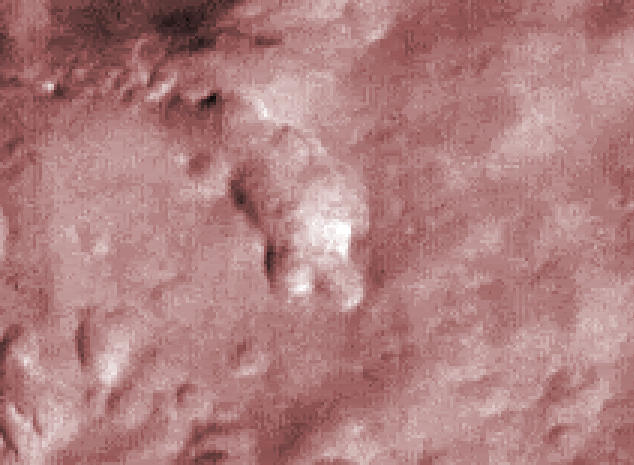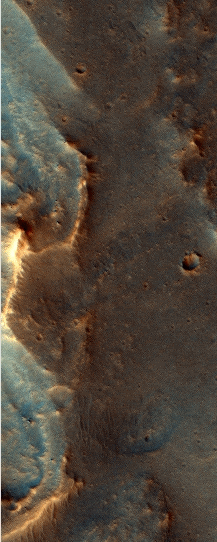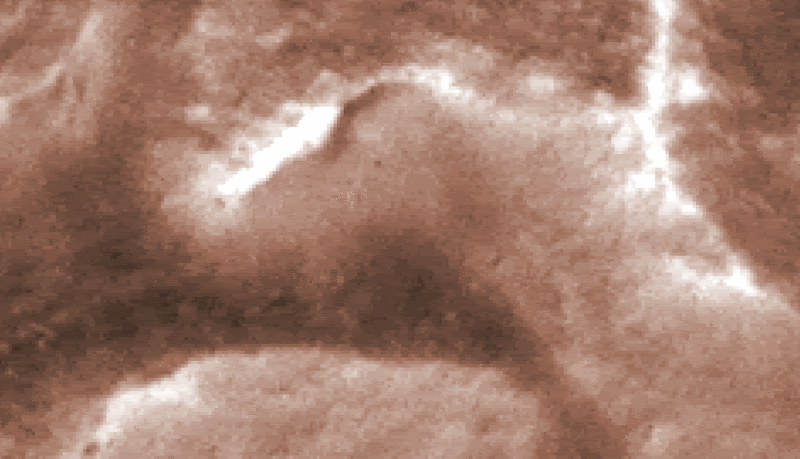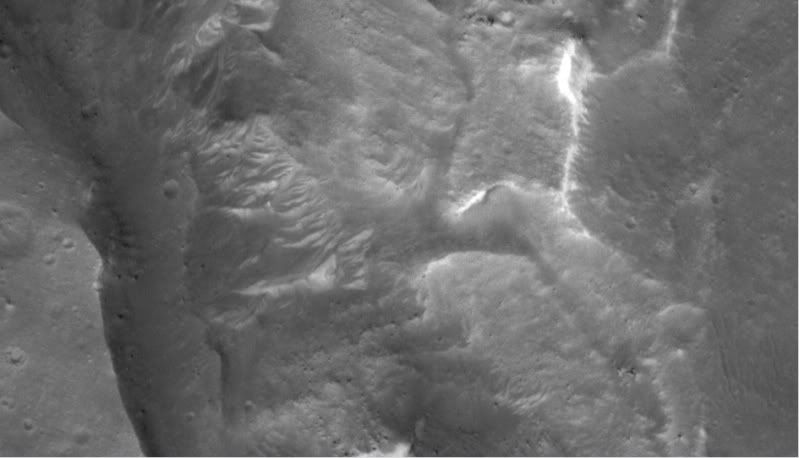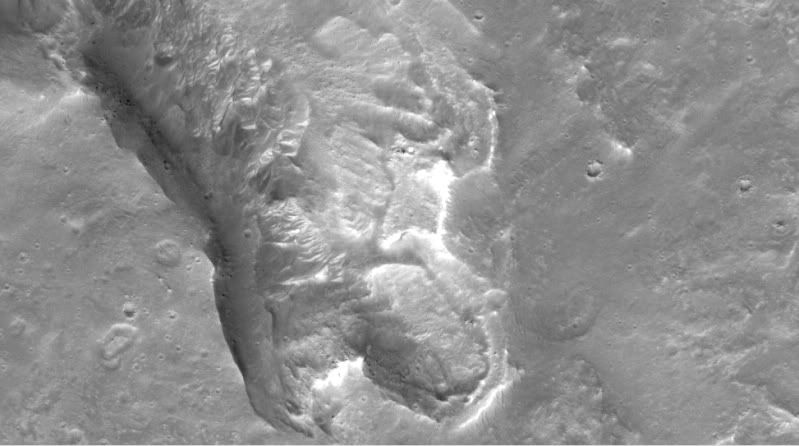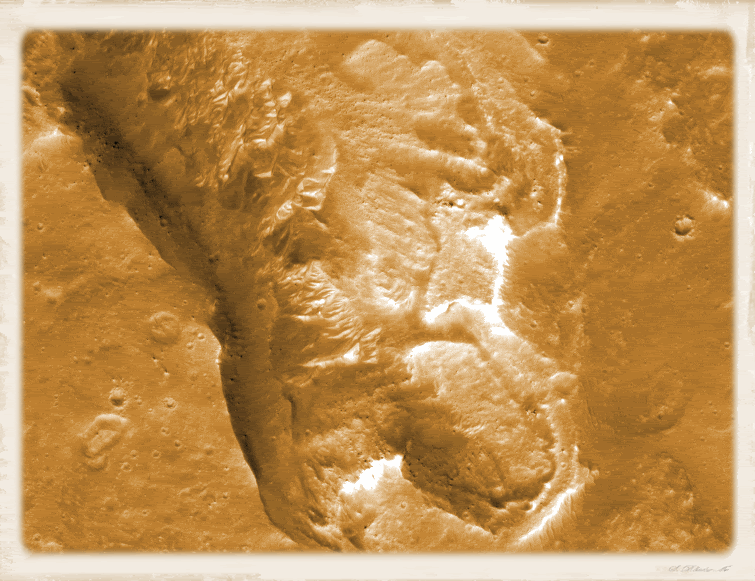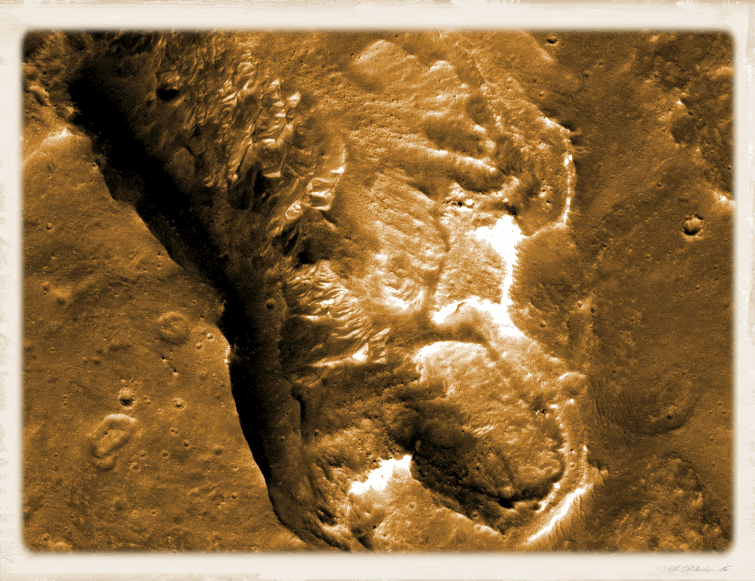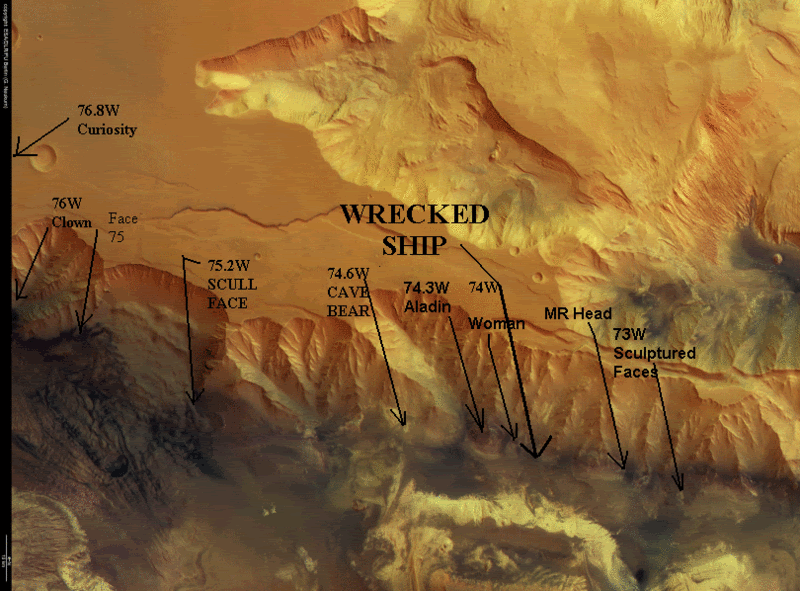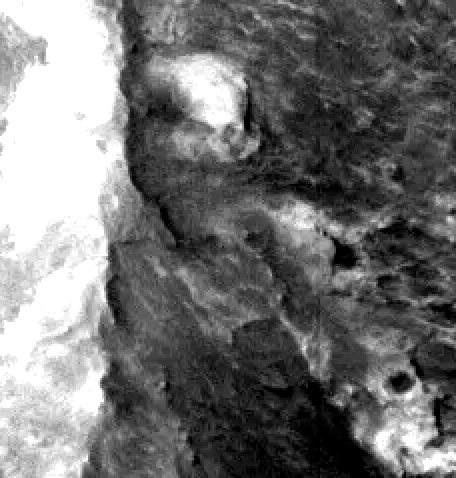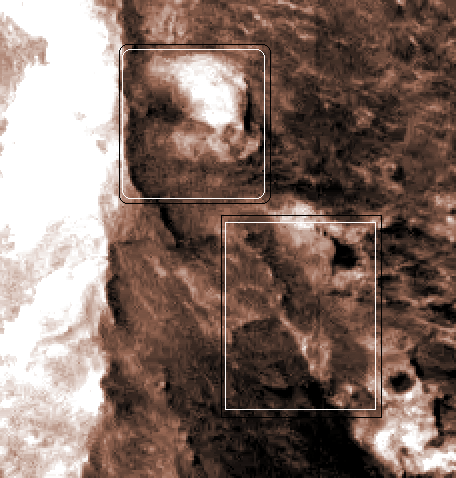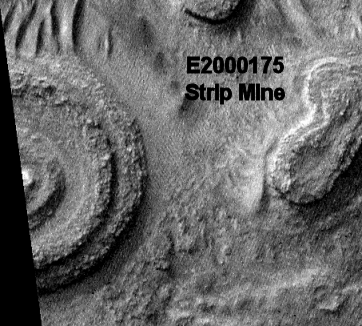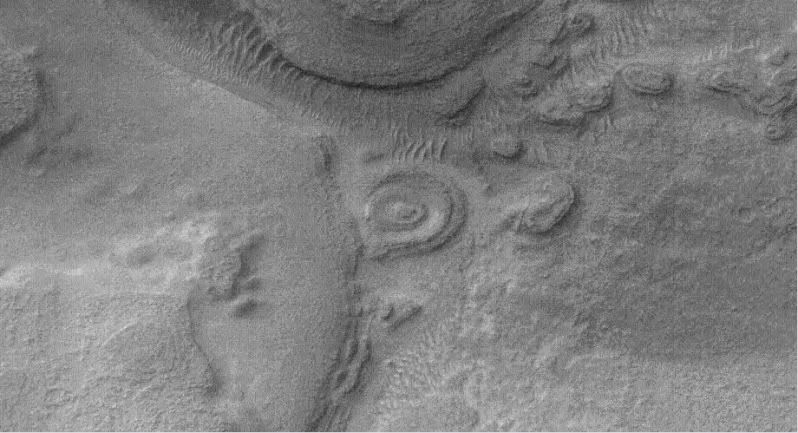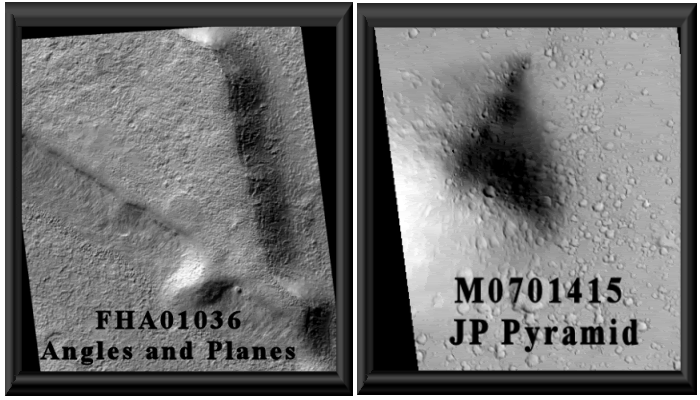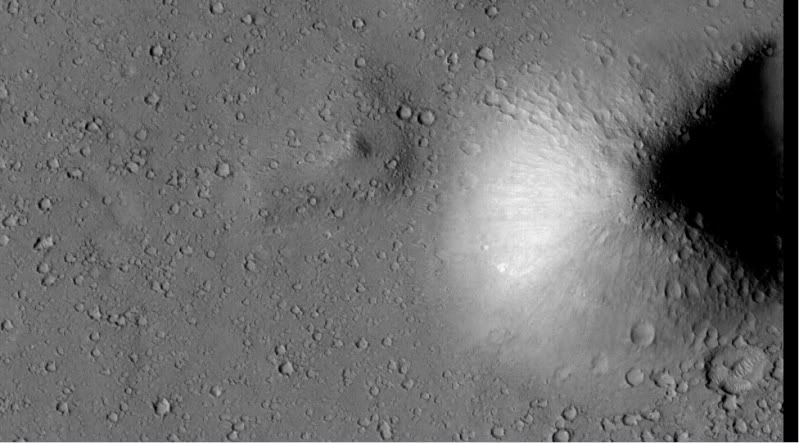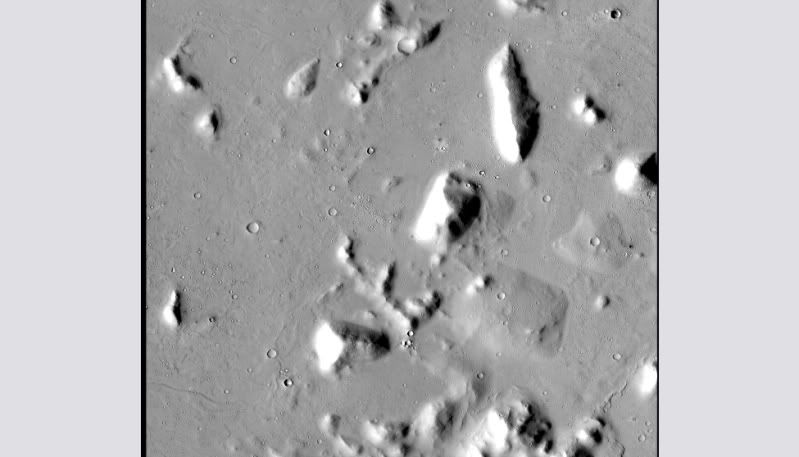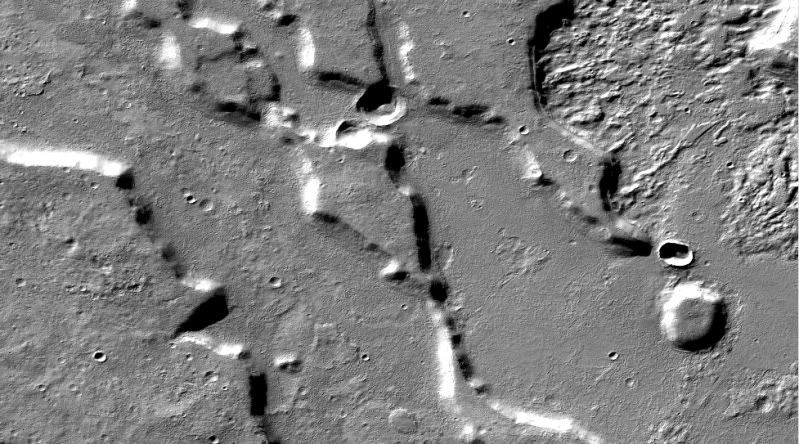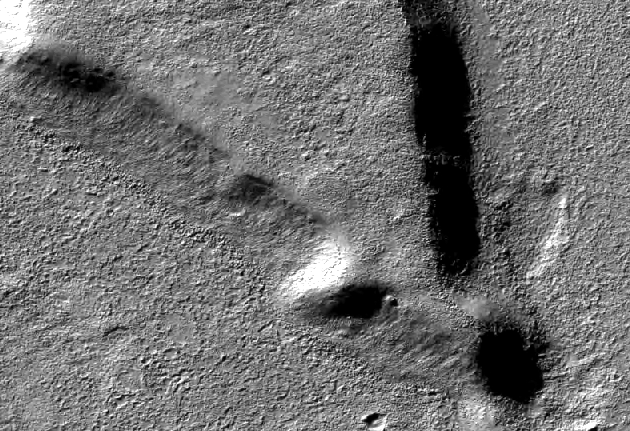- Thank you received: 0
Faces from the Chasmas
- neilderosa
-
- Offline
- Platinum Member
-

Less
More
15 years 6 months ago #23022
by neilderosa
Replied by neilderosa on topic Reply from Neil DeRosa
Here is a little more information on the new Juventae Chasma face. It's about 176 meters wide, which fits into the range of most of the faces we've seen. The HiRISE image resolution is .25 m/p, and the CTX image confirmation is about 5.5 m/p, less than 1/20th of the Hi-res image. But it can still be seen as a face. The coordinates at the image center are 297E or 63W x 4.1S. We can see the edge of the face in the RGB color swath provided by HiRISE. Also in the sepia close-up of the face below we can see a reasonable facsimile of an eye detail. [Neil]
I might also add that this is one of the not-so-numerous instances where we can get an idea of the relative age of the object. Intuitively, there seem to be fewer small craters inside the face than in the surrounding terrain, and also fewer than within other gullies, gouges, and larger craters nearby, indicating that the face may be the newest addition to the field. This exercise can be done statistically, if anyone wanted to make a project of it.
CTX confirmation image B01 010198 1753
RGB HiRISE image edge of face
Close-up of eye detail in sepia
Grayscale close-ups
I might also add that this is one of the not-so-numerous instances where we can get an idea of the relative age of the object. Intuitively, there seem to be fewer small craters inside the face than in the surrounding terrain, and also fewer than within other gullies, gouges, and larger craters nearby, indicating that the face may be the newest addition to the field. This exercise can be done statistically, if anyone wanted to make a project of it.
CTX confirmation image B01 010198 1753
RGB HiRISE image edge of face
Close-up of eye detail in sepia
Grayscale close-ups
Please Log in or Create an account to join the conversation.
- neilderosa
-
- Offline
- Platinum Member
-

Less
More
- Thank you received: 0
15 years 6 months ago #23029
by neilderosa
Replied by neilderosa on topic Reply from Neil DeRosa
As one possible explanation for the faces, Tom once speculated that, in the EPH model, visitors or "tourists" from nearby Planet V may have visited their "moon, Mars" as we might visit our Moon in the future. Using a color scheme similar to the ESA "natural" color images, perhaps this is one tourist attraction that visitors might have spotted when looking through their viewers. This is one explanation for the faces, though I don't think it's the best one. [Neil]
Please Log in or Create an account to join the conversation.
- neilderosa
-
- Offline
- Platinum Member
-

Less
More
- Thank you received: 0
15 years 6 months ago #23753
by neilderosa
Replied by neilderosa on topic Reply from Neil DeRosa
Returning to the many faces of the West Candor chasma, here is the skull-like face found by Marsrocks in the CTX images, (resolution about 5.5 m/p) along with an ESA context map with its position marked. This face, along with a possible companion can be found at around 73W, 7S and easily located using the locator map tool for CTX at the MSSS website. [Neil]
global-data.mars.asu.edu/bin/ctx.pl?res=...6W&day_night=2&rel=0
MR Head
global-data.mars.asu.edu/bin/ctx.pl?res=...6W&day_night=2&rel=0
MR Head
Please Log in or Create an account to join the conversation.
- neilderosa
-
- Offline
- Platinum Member
-

Less
More
- Thank you received: 0
15 years 6 months ago #23044
by neilderosa
Replied by neilderosa on topic Reply from Neil DeRosa
Since this is a science website, even including the artificial structures section, it is just as important to falsify previous models of what was thought to be artificial, as to make new discoveries. Perhaps it is more important, because it shows others that we may possibly have some slight credibility.
In that light, here are three more falsifications made possible by the CTX re-imagings of previous MOC objects.
The first is a spiral-like object posted by me in the past and made known to me by my brother. JR (a former poster) mentioned that if the other half of it continued to look like a spiral, that would be good evidence of artificiality. Well, it does't. The object now resembles the erosional patterns common to the surrounding terrain.
MOC image
CTX re-image
The second is the "JP Pyramid" discovered by Levasseur and discussed in lectures by TVF. The theory was that the MOC low resolution context image indicated the possibility of a field of pyramids, and the only one shown in a hi-res MOC image was very much pyramidal on the side shown. So perhaps they were all pyramidal. They are not. The CTX re-image shows the other side of the JP Pyramid. It is still fairly uniform, but much more rounded on the left (west) side. More importantly, the field is just a number of random mounds in close-up--no pyramids.
MOC image of JP Pyramid along with "Angles and Planes," or "Triangle"
CTX re-image and context for JP Pyramid
The third is the "Triangle" spoken of as such in the TVF lectures, and discovered by Orme. Although I recognized early on that there was no third leg to the triangle, and therefore I called it "Angles and Planes." But I did think it was possibly artificial because of its uniformity. But the CTX re-image shows this uniformity to be simply the typical erosional pattern of the surrounding terrain. Hence all three are falsified. [Neil]
CTX re-image of angles and planes
CTX close-up
In that light, here are three more falsifications made possible by the CTX re-imagings of previous MOC objects.
The first is a spiral-like object posted by me in the past and made known to me by my brother. JR (a former poster) mentioned that if the other half of it continued to look like a spiral, that would be good evidence of artificiality. Well, it does't. The object now resembles the erosional patterns common to the surrounding terrain.
MOC image
CTX re-image
The second is the "JP Pyramid" discovered by Levasseur and discussed in lectures by TVF. The theory was that the MOC low resolution context image indicated the possibility of a field of pyramids, and the only one shown in a hi-res MOC image was very much pyramidal on the side shown. So perhaps they were all pyramidal. They are not. The CTX re-image shows the other side of the JP Pyramid. It is still fairly uniform, but much more rounded on the left (west) side. More importantly, the field is just a number of random mounds in close-up--no pyramids.
MOC image of JP Pyramid along with "Angles and Planes," or "Triangle"
CTX re-image and context for JP Pyramid
The third is the "Triangle" spoken of as such in the TVF lectures, and discovered by Orme. Although I recognized early on that there was no third leg to the triangle, and therefore I called it "Angles and Planes." But I did think it was possibly artificial because of its uniformity. But the CTX re-image shows this uniformity to be simply the typical erosional pattern of the surrounding terrain. Hence all three are falsified. [Neil]
CTX re-image of angles and planes
CTX close-up
Please Log in or Create an account to join the conversation.
15 years 5 months ago #23169
by rhdpre
Hi:
I found this scene in one of the pictures of the European Space Agency ..
I see "structures" that "flew" uneven, monuments .. and anything but a desert ....
(google translator)
"vertical"
"angle"
La panormic ( de la imagen "angulada"):
El Puente y El obelisco desde las 2 perspectivas:
(Est primera imagen se la curraron en un foro; slo coincido con el Puente y Obelisco...)
Desde la "Angulada"
"desde la Vertical"
Del puente se aprecia que la estructura es Rectilinea....y que cruza un desnivel...(no es facil marcar las profundidades de los distintos valles....pero parece cruzar uno: ver panormica)..
En ambas se ven claramente el puente y Obelisco....Veo hasta las sombras...
En la vertical, al norte del obelisco veo "una columna" muy alta.....
Y, concidiendo con la segunda columna del croquis (desde la izquierda y mitad para arriba), veo un pilar con los brazos enn V....
Via-ducto...( la conjura de los pxeles..)
Al principio pens que se trataba de estratos del terreno....Pero hasta que le vi el "chorrito"...
Vis el "Chorito" de agua al final?
Los Crter 1 y 2
El Crter 1, lo veo urbanizado..y en el vii, claramente, un exgono con dos de sus "vertices", "entrando y saliendo" de una oquedad de la montaa...!!!!!!!!!
lo ven?
..no lo ven
Crater 4:
Este, dependiendo de la perspectiva y del formato de la foto parece una cosa distinta....
Plaza de toros; rascacielosal gusto.
En esta, desde la vertical, y en formato JPG, parece "un rascacielos".....
(abajo a las 19H)
La misma en formato TIF...( no tengo claro que el "problema" sea de formatos y no de resoluciones...)
En esta tambien se aprcian el puente y Obelisco....
En la siguiente imagen, entre el crter 3 y 5, "a los pies del 5", veo una estructura que una dos peascos......y en el 5...."formas sinuosas"...
En la sigiente veo un clector..y , al final..el buhito
Replied by rhdpre on topic Reply from
Hi:
I found this scene in one of the pictures of the European Space Agency ..
I see "structures" that "flew" uneven, monuments .. and anything but a desert ....
(google translator)
"vertical"
"angle"
La panormic ( de la imagen "angulada"):
El Puente y El obelisco desde las 2 perspectivas:
(Est primera imagen se la curraron en un foro; slo coincido con el Puente y Obelisco...)
Desde la "Angulada"
"desde la Vertical"
Del puente se aprecia que la estructura es Rectilinea....y que cruza un desnivel...(no es facil marcar las profundidades de los distintos valles....pero parece cruzar uno: ver panormica)..
En ambas se ven claramente el puente y Obelisco....Veo hasta las sombras...
En la vertical, al norte del obelisco veo "una columna" muy alta.....
Y, concidiendo con la segunda columna del croquis (desde la izquierda y mitad para arriba), veo un pilar con los brazos enn V....
Via-ducto...( la conjura de los pxeles..)
Al principio pens que se trataba de estratos del terreno....Pero hasta que le vi el "chorrito"...
Vis el "Chorito" de agua al final?
Los Crter 1 y 2
El Crter 1, lo veo urbanizado..y en el vii, claramente, un exgono con dos de sus "vertices", "entrando y saliendo" de una oquedad de la montaa...!!!!!!!!!
lo ven?
..no lo ven
Crater 4:
Este, dependiendo de la perspectiva y del formato de la foto parece una cosa distinta....
Plaza de toros; rascacielosal gusto.
En esta, desde la vertical, y en formato JPG, parece "un rascacielos".....
(abajo a las 19H)
La misma en formato TIF...( no tengo claro que el "problema" sea de formatos y no de resoluciones...)
En esta tambien se aprcian el puente y Obelisco....
En la siguiente imagen, entre el crter 3 y 5, "a los pies del 5", veo una estructura que una dos peascos......y en el 5...."formas sinuosas"...
En la sigiente veo un clector..y , al final..el buhito
Please Log in or Create an account to join the conversation.
15 years 3 months ago #23534
by marsrocks
Replied by marsrocks on topic Reply from David Norton
I have a three page tribute to Neil DeRosa, and his collection of images on the Mars Anomalies website.
Thanks to Rich DeRosa, Tom DeRosa, and Neil's other family members who have gratiously allowed me to do this. Over the time Neil studied this topic, he put up a huge number of intriguing images. I think many of you will enjoy seeing his images all in a single collection:
[url] www.marsanomalies.com/faces [/url]
Thanks to Rich DeRosa, Tom DeRosa, and Neil's other family members who have gratiously allowed me to do this. Over the time Neil studied this topic, he put up a huge number of intriguing images. I think many of you will enjoy seeing his images all in a single collection:
[url] www.marsanomalies.com/faces [/url]
Please Log in or Create an account to join the conversation.
Time to create page: 0.365 seconds

